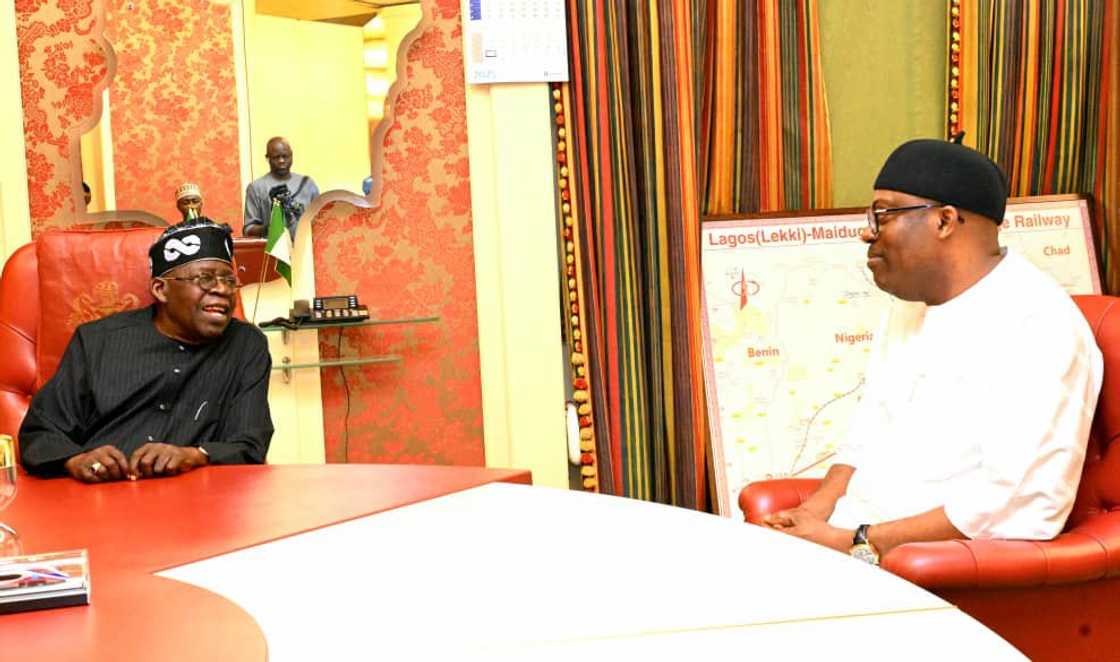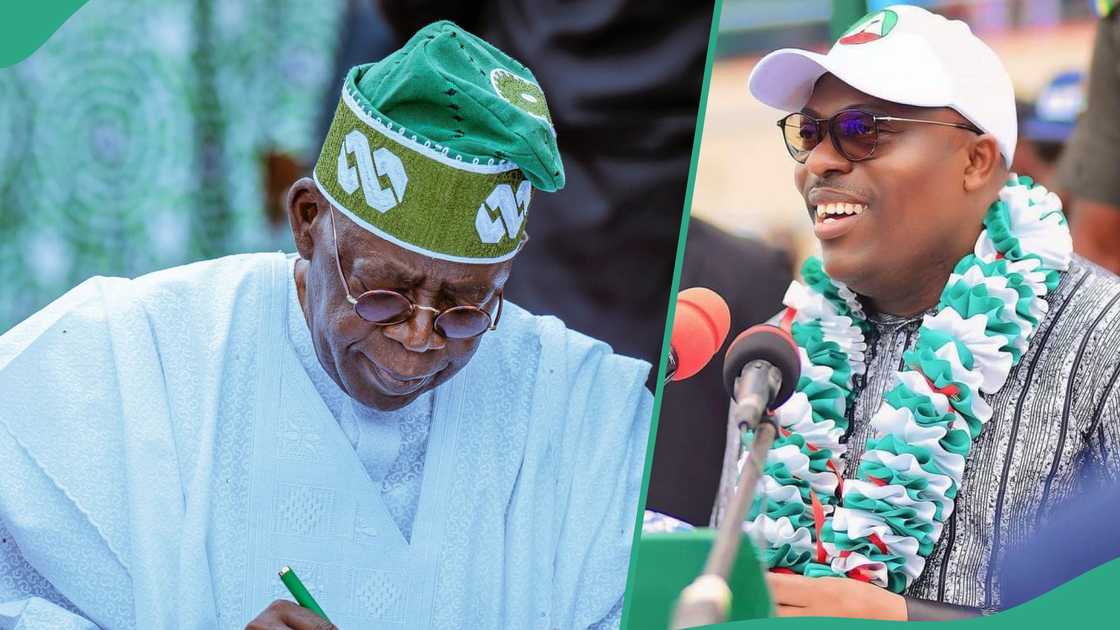In a significant political development that has captured the attention of Nigerians and observers across West Africa, Governor Siminalayi Fubara of Rivers State made an appearance at the presidential villa in Abuja. This pivotal visit aimed to facilitate a meeting with President Bola Tinubu, coming after a period of intense political turbulence in Rivers State that culminated in both the governor’s suspension and subsequent reinstatement.
Governor Fubara’s appearance at the state house is more than a routine courtesy—it marks the first official engagement since President Tinubu ordered his reinstatement, following six months under an emergency rule. The extraordinary circumstances surrounding Rivers State’s governance placed intense scrutiny on every move by the reinstated executive, making this visit one of deep symbolic and practical consequence for the state and for Nigerian federalism as a whole.
When did Fubara visit presidential villa?
According to official sources, Governor Fubara arrived at the presidential villa at exactly 6:20 p.m. on Monday, September 22, and proceeded straight to the president’s office for high-level discussions. The timing of this visit is significant, coming just days after deep unrest and an extraordinary intervention in the state’s governance.
To understand the gravity of this moment, it is important to recall recent events: On March 18, 2025, President Tinubu placed Rivers State under emergency rule and suspended Governor Fubara, the deputy governor, as well as members of the state’s House of Assembly. This drastic action was prompted by a wave of political unrest and breakdown of civil authority, raising constitutional and legal questions about executive powers during national crises.
After months of speculation and political negotiation, the federal government moved to lift the state of emergency. On Wednesday, September 17, 2025, President Tinubu officially suspended the emergency rule, paving the way for Governor Fubara’s return to power. The political tension began to ease, yet many observers noted the challenges that awaited the governor upon his return.
Governor Fubara’s journey back to Rivers was itself a momentous event. He did not immediately return to office but instead made his reappearance on Friday morning, September 19, when he touched down at Port Harcourt International Airport. Supporters and local leaders, relieved yet still wary, gathered en masse to welcome him home and signal the enduring importance of local leadership during times of uncertainty.
Reactions as Fubara returns to the country
As Governor Fubara’s return video circulated widely on Channels TV and across social media, Nigerians responded passionately. The footage galvanized public opinion, inspiring both words of encouragement and critical analysis from people across the nation. The growing influence of digital platforms in shaping narratives around governance was put on full display.

Photo Credit: @Imranmuhdz
Source: Twitter
Some of the most resonant public reactions are featured below, highlighting the range of sentiments in the wake of this leadership showdown:
Bayo Olupohunda commented:
“There are no Saints in this Rivers tragedy. Both Wike and Fubara are Villains. Both are responsible for the state of anarchy in Rivers. Both are guilty.”
Murtala criticised the supporters:
“Truly amazing, waiting hours for a politician, but can’t fill streets for accountability. When dem remove Fubara like joke, una no fit gather. Now una dey shout welcome. Jobless noise, shameless loyalty.”
Ayetoto said:
“Same powerless crowds who cheered Fubara to this situation are the same crowd that welcome him back for more deceit. The devil no be wetin you think say e be. If you don’t learn from this. Then you don’t know the world you are in.”
Joel alleged:
“Baba left Nigeria to live a better life when there was no power. Now he is back to rule his slaves in Rivers.. Nigerian politicians are all evil and useless.”
Duke of Emevor wrote:
“The ceremonial governor has arrived; the state assembly members are waiting for you.”
For further perspectives and wider audience engagement, see coverage and reactions from additional sources, including Channels TV:
See
https://x.com/channelstv/status/1969003689982497253?
here:
Political implications for Rivers State and beyond
The sequence of suspension, emergency rule, and reinstatement has reignited national discussion about how Nigeria addresses breakdowns in local governance. These events are not seen in isolation, as they mirror similar interventions witnessed in other states where federal authority has been leveraged to restore order. According to Kelechi Obinna, a Lagos-based policy analyst, “Federal interventions should be a last resort, but when invoked, they must adhere closely to Nigeria’s constitutional safeguards. What happened in Rivers State will prompt legal scholars to revisit debates about separation of powers and executive overreach.”
For the people of Rivers, the aftermath of the emergency rule holds tangible impact. Many civil servants faced months of disruption, while development projects were reportedly put on hold. Community leaders have called for a swift return to normalcy, and local businesses hope the governor’s reinstatement will restore confidence and economic continuity.
On the political front, Fubara’s return also has the potential to reconfigure alliances within the Rivers State Assembly and among traditional leaders. As political scientist Dr. Chidera Nwachukwu noted, “Local governance in Nigeria hinges on a delicate balance of federal oversight and local legitimacy. The Rivers case reminds us just how fragile this balance is—and how important it is for leaders to foster dialogue that avoids crisis recurrence.”
Wike defends Fubara’s absence in Rivers
One controversial aspect of Governor Fubara’s return was his delayed resumption of duties. According to leading reports, FCT Minister Nyesom Wike stepped in to clarify the situation, making a pointed remark that “no law compelled Governor Fubara to resume immediately.”
Wike’s statement sought to quell rumors and speculation about why Fubara was not in office immediately after President Tinubu lifted his suspension, instead underscoring the highly charged and unpredictable nature of governance transitions during emergency periods. According to political commentators, these explanations are important not only for Rivers State but for the broader practice of executive transitions in Nigeria’s federal landscape.
President Tinubu officially lifted the state of emergency on Wednesday, instructing Governor Fubara to return and resume his leadership duties. The coming weeks are expected to test the governor’s ability to navigate old rivalries, rebuild trust, and re-establish the machinery of state governance. This episode serves as a case study in the interplay between constitutionally guaranteed governance rights and the exceptional tools at the disposal of federal authorities.
How Nigerians and West Africans see the path forward
The story of Rivers State’s crisis and resolution resonates deeply not only within Nigeria but across Africa, where subnational governance remains both a challenge and a pillar of democratic progress. Many Ghanaians, Liberians, and regional observers have followed the events closely, viewing Nigeria as a bellwether for political stability in West Africa.
Citizens and experts alike agree that transparency, accountability, and constitutionalism must remain at the heart of any intervention. Questions persist about the long-term solution: Will Rivers State be able to rebuild political trust, and is this a model for crisis resolution that empowers or weakens local democracy?
- Challenges: Maintaining peace and stability post-reinstatement, especially with fractured alliances in local institutions.
- Opportunities: Renewed dialogue between federal and state actors, and a spotlight on the importance of constitutional checks and balances.
- Regional implications: The case prompts other West African governments to consider reforms for handling political emergencies in a way that protects civil liberties and public order.
As Rivers State begins a new chapter, public engagement in democratic processes and transparent communication from elected officials will be critical in healing divisions and moving forward. The lessons from this episode bear watching—not only for Nigerians, but for a continent seeking stronger, more resilient institutions in the face of uncertainty.
Where do you stand on the developments in Rivers State? What can other Nigerian states—or even West African countries—learn from this experience? Share your thoughts and be part of the conversation shaping the future of governance in our region.
Have a story you want to share or sell about leadership, politics, or your local community? We want to hear from you! Email us at
story@nowahalazone.com to get your story featured or discuss story sales.
For general support or to share your opinions and news tips, contact us at
support@nowahalazone.com.
Join the discussion—drop a comment below, and follow us on
Facebook,
X (Twitter), and
Instagram for the latest updates, political analysis, and breaking news stories relevant to Nigeria, West Africa, and beyond!










